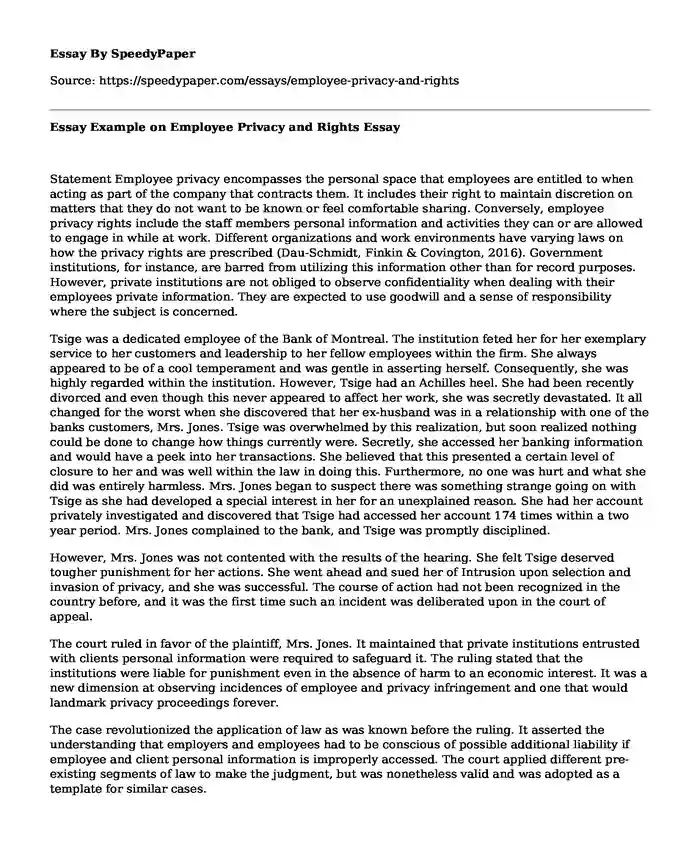
| Type of paper: | Essay |
| Categories: | Human resources Information technologies Employment law |
| Pages: | 4 |
| Wordcount: | 830 words |
Statement Employee privacy encompasses the personal space that employees are entitled to when acting as part of the company that contracts them. It includes their right to maintain discretion on matters that they do not want to be known or feel comfortable sharing. Conversely, employee privacy rights include the staff members personal information and activities they can or are allowed to engage in while at work. Different organizations and work environments have varying laws on how the privacy rights are prescribed (Dau-Schmidt, Finkin & Covington, 2016). Government institutions, for instance, are barred from utilizing this information other than for record purposes. However, private institutions are not obliged to observe confidentiality when dealing with their employees private information. They are expected to use goodwill and a sense of responsibility where the subject is concerned.
Tsige was a dedicated employee of the Bank of Montreal. The institution feted her for her exemplary service to her customers and leadership to her fellow employees within the firm. She always appeared to be of a cool temperament and was gentle in asserting herself. Consequently, she was highly regarded within the institution. However, Tsige had an Achilles heel. She had been recently divorced and even though this never appeared to affect her work, she was secretly devastated. It all changed for the worst when she discovered that her ex-husband was in a relationship with one of the banks customers, Mrs. Jones. Tsige was overwhelmed by this realization, but soon realized nothing could be done to change how things currently were. Secretly, she accessed her banking information and would have a peek into her transactions. She believed that this presented a certain level of closure to her and was well within the law in doing this. Furthermore, no one was hurt and what she did was entirely harmless. Mrs. Jones began to suspect there was something strange going on with Tsige as she had developed a special interest in her for an unexplained reason. She had her account privately investigated and discovered that Tsige had accessed her account 174 times within a two year period. Mrs. Jones complained to the bank, and Tsige was promptly disciplined.
However, Mrs. Jones was not contented with the results of the hearing. She felt Tsige deserved tougher punishment for her actions. She went ahead and sued her of Intrusion upon selection and invasion of privacy, and she was successful. The course of action had not been recognized in the country before, and it was the first time such an incident was deliberated upon in the court of appeal.
The court ruled in favor of the plaintiff, Mrs. Jones. It maintained that private institutions entrusted with clients personal information were required to safeguard it. The ruling stated that the institutions were liable for punishment even in the absence of harm to an economic interest. It was a new dimension at observing incidences of employee and privacy infringement and one that would landmark privacy proceedings forever.
The case revolutionized the application of law as was known before the ruling. It asserted the understanding that employers and employees had to be conscious of possible additional liability if employee and client personal information is improperly accessed. The court applied different pre-existing segments of law to make the judgment, but was nonetheless valid and was adopted as a template for similar cases.
Employee monitoring and surveillance is commonplace in many workplaces. The practice is adopted the world over to spur productivity and encourage maximum use of company resources. Other institutions employ the technique to avoid pilferage and unnecessary downtime occasioned by laziness and engagement in unrelated activities. It may occur in the form of electronic monitoring, camera monitoring, drug and alcohol testing or personal searches. As Blanchard (2016) explains, firms may monitor computers, phones and email use of its employees as well as install video cameras to take stock of their actions. It is the legal right of every company to carry out monitoring and surveillance on their employees. However, I would recommend that all monitoring policies be documented, well-defined as well as be communicated and acknowledged by employees.
Moreover, the company should establish bounds within which monitoring occurs and should clearly indicate that employees should not expect privacy when using the firms systems or when on its property. This would lead to a greater level of awareness within employees, making them less predisposed to misusing the firms property (Blanchard, 2016). They will also be considerably careful when conducting themselves and will refrain from activities that would otherwise be deemed inappropriate within the context.
While monitoring and surveillance may be advantageous to the employers prospects by spurring integrity among members of staff, it is prone to misuse by those in authority or the system management team. Therefore, paramount fidelity is recommended in the conduct of the exercise.
References
Blanchard, O. (2016). Employee Privacy In Light of New Technologies: An Ethical and Strategic Framework.
Dau-Schmidt, K. G., Finkin, M., & Covington, R. (2016). Legal protection for the individual employee. West Academic.
Cite this page
Essay Example on Employee Privacy and Rights. (2019, Oct 24). Retrieved from https://speedypaper.com/essays/employee-privacy-and-rights
Request Removal
If you are the original author of this essay and no longer wish to have it published on the SpeedyPaper website, please click below to request its removal:
- Free Essay Sample on Protective Role of Blood Groups
- Management of Diabetes - Free Essay with a Literature Review Example
- Improving the Health and Wellbeing of the Valley's Teens - Essay Sample
- Free Essay Example on Religious Beliefs
- Free Essay with Literature Review of Postnatal Stress Teen Mothers and Fathers in Rural Australia
- Essay Sample on 2020 MCC International Fellowship to Greece
- A Bilingual Advantage in Task Switching - Free Essay Sample
Popular categories




